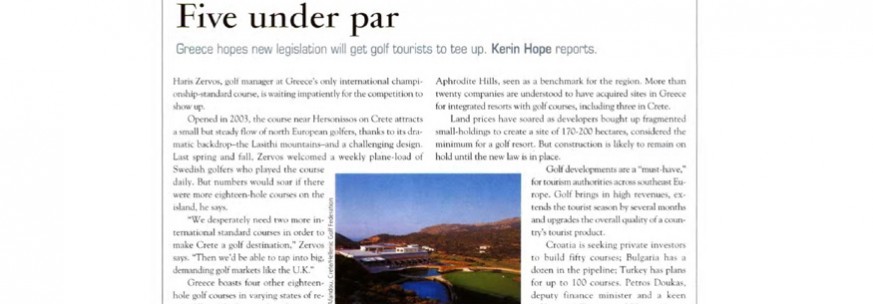By Kerin Hope
Greece hopes new legislation will get golf tourists to tee up. Kerin Hope reports.
Haris Zervos, golf manager at Greece’s only international championship-standard course, is waiting impatiently for the competition to show up.
Opened in 2003. the course near Hersonissos on Crete attracts 3 small but steady flow of north European golfers, thanks to dramatic backdrop-the Lasithi mountains-and a Challenging design. Last spring and fall. Zervos welcomed a weekly planeload of Swedish golfers who played the course daily. But numbers would soar if there were more eighteen-hole Courses on the island, he says.
“We desperately need two more international standard courses in order to make Crete a golf destination.” Zervos says. “Then we’d be able to tap into big, demanding golf markets like the UK.”
Greece boasts four other eighteen-hole golf courses in varying states of repair. All were built more than thirty years ago; none was designed by a big-name golf professional.
Rather than play golf on Rhodes or Corfu, Athens-based foreign executives head for Spain’s Costa del Sol or Portugals Algarve. With more than 500 public courses and another 200 residential golf resorts. Iberia sets the pace for golf tourism in Europe.
For Greece, the catalyst for golf tourism will be new legislation to promote leisure-integrated residential resorts. Based on a Cypriot model, the law is set to be approved during parliament’s summer session. lt would streamline a complex permitting process and change the building co-efficient for resort developments-allowing several hundred villas to be built around a golf course, alongside one or two luxury hotels.
“Sales of residential property, whether second homes or timeshares, are the key to attracting international investors,” says Miltos Kambourides, managing partner of Athens-based Dolphin Capital lnvestors. a private equity company listed on London’s AIM market.
With five eighteen-hole courses in operation and another eleven in the pipeline. Cyprus is already taking off as a year-round golf destination. Prices of residential property at Aphrodite Hills, a high-end golf and spa resort in the south of the island, have doubled since the course opened four years ago.
Most buyers are north Europeans
Resort developers in Greece: are keen to match the success of Aphrodite Hills. seen as al benchmark for the region. More than twenty companies are understood to have acquired sites in Greece for integrated resorts with golf courses, including three in Crete.
Land prices have soared as developers bought up fragmented smallholding to create a site of 170-200 hectares, considered the minimum for a golf resort. But construction is likely to remain on hold until the new law is in place.
Golf developments are a “must-have”, for tourism authorities across southeast Europe. Golf brings in high revenues, extends the tourist season by several months and upgrades the overall quality of a country’s tourist product.
Croatia is seeking private investors to build fifty courses; Bulgaria has a dozen in the pipeline; Turkey has plans for up to 100 courses. Petros Doukas, deputy finance minister and a keen golfer, says Greece could have twenty courses operating by 2012.
IMG, the U.S. sports marketing group, says there are eleven million international golfers prepared to play a championship course anywhere in the world. They spend an average of €3.000 a week-about four times more than “sun-and-sea” tourists. One in ten is ready to buy a second home next to a favorite golf course.
Hersonissos has helped dispel an unflattering Greek image of golf as elitist and environmentally damaging. Carved out of a scrub-covered hillside, the “desert-category” course residential was designed with the dry Cretan environment in mind. Fairway’s and greens are irrigated from a reservoir fed by winter rainfall. New grass varieties developed for golf include “paspalum” which can be irrigated with saline water.
In mainland Greece a €100million project at Kilada Hills near Porto Heli in the Peloponnese is Close to breaking ground. Dolphin Capital is investing alongside Ergorex, a Greek developer that has acquired from local residents 1,004 square kilometers of pastureland close to the sea, dotted with olive groves and pines.
The provides for an eighteen-hole championship course, a 700-bed hotel, a golf academy and 200 luxury villas. The plan covers both the resort site at Kilada and the surrounding area. “To make leisure-integrated resorts a success you must work closely with the local community,” Kambourides says.

